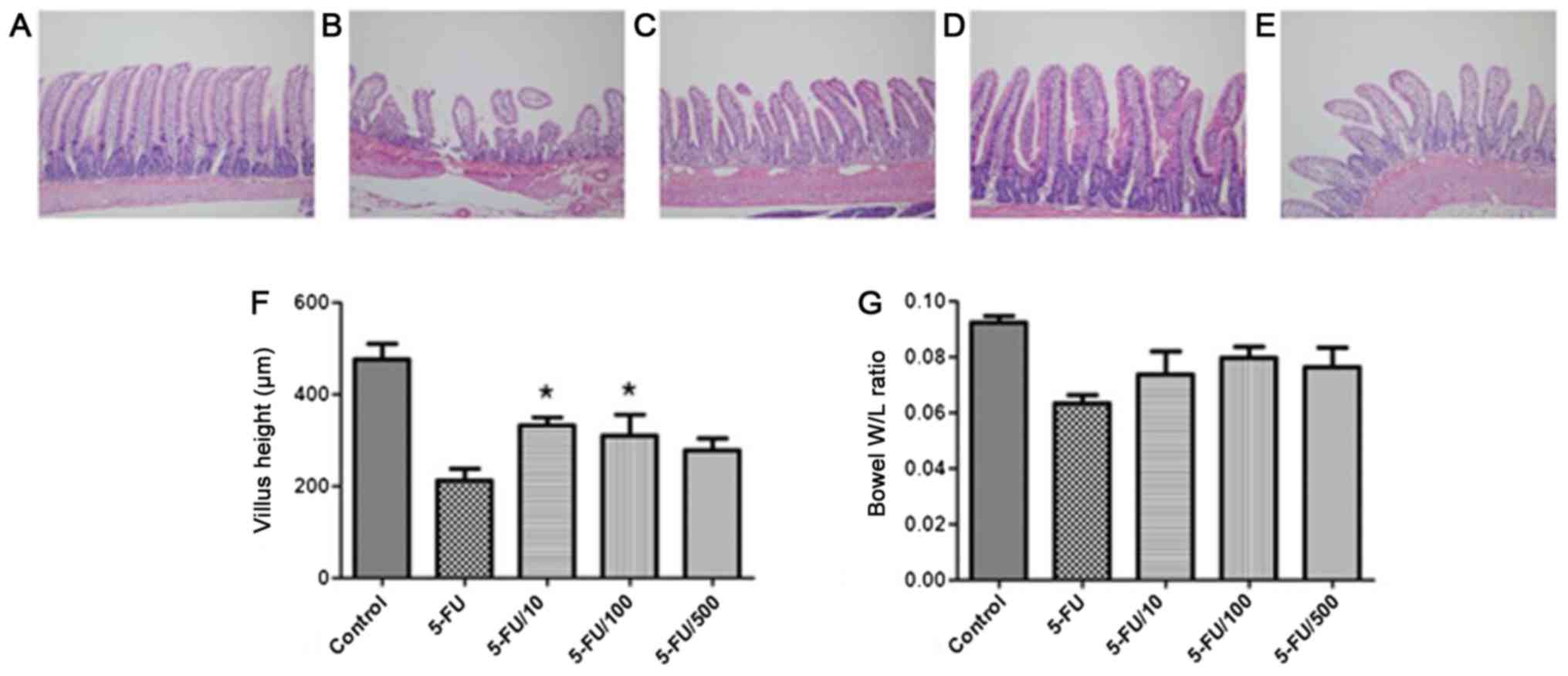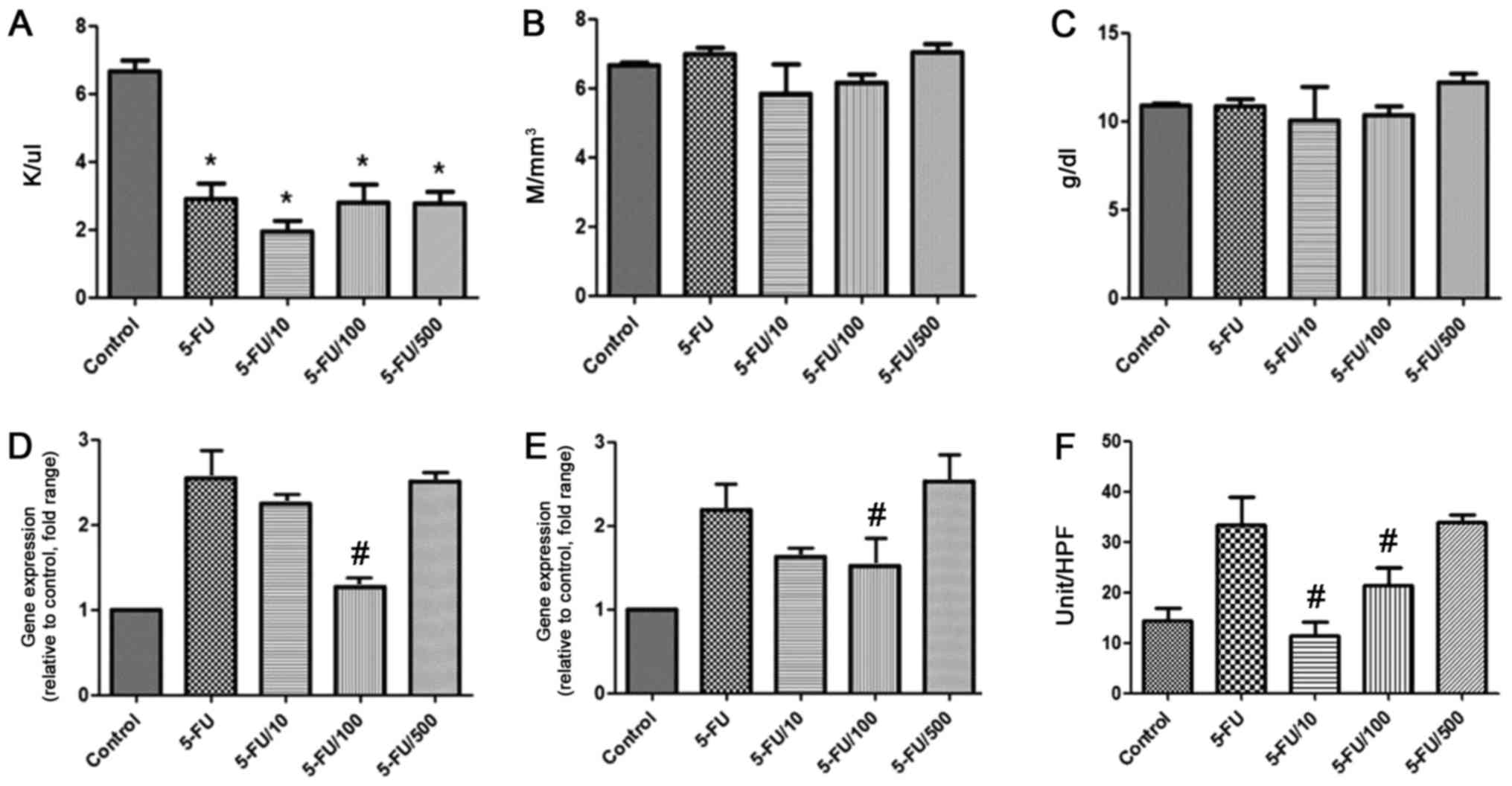|
1
|
Benson AB III, Ajani JA, Catalano RB,
Engelking C, Kornblau SM, Martenson JA Jr, McCallum R, Mitchell EP,
O'Dorisio TM, Vokes EE and Wadler S: Recommended guidelines for the
treatment of cancer treatment-induced diarrhea. J Clin Oncol.
22:2918–2926. 2004. View Article : Google Scholar : PubMed/NCBI
|
|
2
|
Bowen JM, Gibson RJ, Cummins AG and Keefe
DM: Intestinal mucositis: The role of the Bcl-2 family, p53 and
caspases in chemotherapy-induced damage. Support Care Cancer.
14:713–731. 2006. View Article : Google Scholar : PubMed/NCBI
|
|
3
|
Keefe DMK, Brealey J, Goland GJ and
Cummins AG: Chemotherapy for cancer causes apoptosis that precedes
hypoplasia in crypts of the small intestine in humans. Gut.
47:632–637. 2000. View Article : Google Scholar : PubMed/NCBI
|
|
4
|
Maioli TU, de Melo Silva B, Dias MN, Paiva
NC, Cardoso VN, Fernandes SO, Carneiro CM, Dos Santos Martins F and
de Vasconcelos Generoso S: Pretreatment with Saccharomyces
boulardii does not prevent the experimental mucositis in Swiss
mice. J Negat Results Biomed. 13:62014. View Article : Google Scholar : PubMed/NCBI
|
|
5
|
Smith CL, Geier MS, Yazbeck R, Torres DM,
Butler RN and Howarth GS: Lactobacillus fermentum BR11 and
fructo-oligosaccharide partially reduce jejunal inflammation in a
model of intestinal mucositis in rats. Nutr Cancer. 60:757–767.
2008. View Article : Google Scholar : PubMed/NCBI
|
|
6
|
Sonis ST, Elting LS, Keefe D, Peterson DE,
Schubert M, Hauer-Jensen M, Bekele BN, Raber-Durlacher J, Donnelly
JP, Rubenstein EB, et al: Perspectives on cancer therapy-induced
mucosal injury: Pathogenesis, measurement, epidemiology, and
consequences for patients. Cancer. 100(9 Suppl): S1995–S2025. 2004.
View Article : Google Scholar
|
|
7
|
Gibson RJ, Keefe DM, Lalla RV, Bateman E,
Blijlevens N, Fijlstra M, King EE, Stringer AM, van der Velden WJ,
Yazbeck R, et al: Systematic review of agents for the management of
gastrointestinal mucositis in cancer patients. Support Care Cancer.
21:313–326. 2013. View Article : Google Scholar : PubMed/NCBI
|
|
8
|
Rubenstein EB, Peterson DE, Schubert M,
Keefe D, McGuire D, Epstein J, Elting LS, Fox PC, Cooksley C, Sonis
ST, et al: Clinical practice guidelines for the prevention and
treatment of cancer therapy-induced oral and gastrointestinal
mucositis. Cancer. 100(9 Suppl): S2026–S2046. 2004. View Article : Google Scholar
|
|
9
|
Bhatt V, Vendrell N, Nau K, Crumb D and
Roy V: Implementation of a standardized protocol for prevention and
management of oral mucositis in patients undergoing hematopoietic
cell transplantation. J Oncol Pharm Pract. 16:195–204. 2010.
View Article : Google Scholar : PubMed/NCBI
|
|
10
|
Bajic JE, Eden GL, Lampton LS, Cheah KY,
Lymn KA, Pei JV, Yool AJ and Howarth GS: Rhubarb extract partially
improves mucosal integrity in chemotherapy-induced intestinal
mucositis. World J Gastroenterol. 22:8322–8333. 2016. View Article : Google Scholar : PubMed/NCBI
|
|
11
|
Hwang MJ and Kim TN: Diffuse-type Caroli
disease with characteristic central dot sign complicated by
multiple intrahepatic and common bile duct stones. Clin Endosc.
50:400–403. 2017. View Article : Google Scholar : PubMed/NCBI
|
|
12
|
Kwon CI and Lehman GA: Mechanisms of
biliary plastic stent occlusion and efforts at prevention. Clin
Endosc. 49:139–146. 2016. View Article : Google Scholar : PubMed/NCBI
|
|
13
|
Yoo KH, Kwon CI, Yoon SW, Kim WH, Lee JM,
Ko KH, Hong SP and Park PW: An impacted pancreatic stone in the
papilla induced acute obstructive cholangitis in a patient with
chronic pancreatitis. Clin Endosc. 45:99–102. 2012. View Article : Google Scholar : PubMed/NCBI
|
|
14
|
Güldütuna S, Zimmer G, Imhof M, Bhatti S,
You T and Leuschner U: Molecular aspects of membrane stabilization
by ursodeoxycholate [see comment]. Gastroenterology. 104:1736–1744.
1993. View Article : Google Scholar : PubMed/NCBI
|
|
15
|
Rodrigues CM, Fan G, Ma X, Kren BT and
Steer CJ: A novel role for ursodeoxycholic acid in inhibiting
apoptosis by modulating mitochondrial membrane perturbation. J Clin
Invest. 101:2790–2799. 1998. View
Article : Google Scholar : PubMed/NCBI
|
|
16
|
Rodrigues CM, Fan G, Wong PY, Kren BT and
Steer CJ: Ursodeoxycholic acid may inhibit deoxycholic acid-induced
apoptosis by modulating mitochondrial transmembrane potential and
reactive oxygen species production. Mol Med. 4:165–178.
1998.PubMed/NCBI
|
|
17
|
Lapenna D, Ciofani G, Festi D, Neri M,
Pierdomenico SD, Giamberardino MA and Cuccurullo F: Antioxidant
properties of ursodeoxycholic acid. Biochem Pharmacol.
64:1661–1667. 2002. View Article : Google Scholar : PubMed/NCBI
|
|
18
|
Cao A, Wang L, Chen X, Guo H, Chu S, Zhang
X and Peng W: Ursodeoxycholic acid ameliorated diabetic nephropathy
by attenuating hyperglycemia-mediated oxidative stress. Biol Pharm
Bull. 39:1300–1308. 2016. View Article : Google Scholar : PubMed/NCBI
|
|
19
|
Mroz MS, Lajczak NK, Goggins BJ, Keely S
and Keely SJ: The bile acids, deoxycholic acid and ursodeoxycholic
acid, regulate colonic epithelial wound healing. Am J Physiol
Gastrointest Liver Physiol. 314:G378–G387. 2018. View Article : Google Scholar : PubMed/NCBI
|
|
20
|
Lajczak NK, Saint-Criq V, O'Dwyer AM,
Perino A, Adorini L, Schoonjans K and Keely SJ: Bile acids
deoxycholic acid and ursodeoxycholic acid differentially regulate
human β-defensin-1 and −2 secretion by colonic epithelial cells.
FASEB J. 31:3848–3857. 2017. View Article : Google Scholar : PubMed/NCBI
|
|
21
|
Bernardes-Silva CF, Damião AO, Sipahi AM,
Laurindo FR, Iriya K, Lopasso FP, Buchpiguel CA, Lordello ML,
Agostinho CL and Laudanna AA: Ursodeoxycholic acid ameliorates
experimental ileitis counteracting intestinal barrier dysfunction
and oxidative stress. Dig Dis Sci. 49:1569–1574. 2004. View Article : Google Scholar : PubMed/NCBI
|
|
22
|
Kurita A, Kado S, Kaneda N, Onoue M,
Hashimoto S and Yokokura T: Modified irinotecan hydrochloride
(CPT-11) administration schedule improves induction of
delayed-onset diarrhea in rats. Cancer Chemother Pharmacol.
46:211–220. 2000. View Article : Google Scholar : PubMed/NCBI
|
|
23
|
Livak KJ and Schmittgen TD: Analysis of
relative gene expression data using real-time quantitative PCR and
the 2(-Delta Delta C(T)) method. Methods. 25:402–408. 2001.
View Article : Google Scholar : PubMed/NCBI
|
|
24
|
Krawisz JE, Sharon P and Stenson WF:
Quantitative assay for acute intestinal inflammation based on
myeloperoxidase activity. Assessment of inflammation in rat and
hamster models. Gastroenterology. 87:1344–1350. 1984.PubMed/NCBI
|
|
25
|
Lindor KD, Kowdley KV, Luketic VA,
Harrison ME, McCashland T, Befeler AS, Harnois D, Jorgensen R, Petz
J, Keach J, et al: High-dose ursodeoxycholic acid for the treatment
of primary sclerosing cholangitis. Hepatology. 50:808–814. 2009.
View Article : Google Scholar : PubMed/NCBI
|
|
26
|
Cullen SN, Rust C, Fleming K, Edwards C,
Beuers U and Chapman RW: High dose ursodeoxycholic acid for the
treatment of primary sclerosing cholangitis is safe and effective.
J Hepatol. 48:792–800. 2008. View Article : Google Scholar : PubMed/NCBI
|
|
27
|
Oh B, Choi WS, Park SB, Cho B, Yang YJ,
Lee ES and Lee JH: Efficacy and safety of ursodeoxycholic acid
composite on fatigued patients with elevated liver function and/or
fatty liver: A multi-centre, randomised, double-blinded,
placebo-controlled trial. Int J Clin Pract. 70:302–311. 2016.
View Article : Google Scholar : PubMed/NCBI
|
|
28
|
Renner EL, Lake JR, Cragoe EJ Jr, van Dyke
RW and Scharschmidt BF: Ursodeoxycholic acid choleresis:
Relationship to biliary HCO-3 and effects of Na+-H+ exchange
inhibitors. Am J Physiol. 254:G232–G241. 1988.PubMed/NCBI
|
|
29
|
Sagawa H, Tazuma S and Kajiyama G:
Protection against hydrophobic bile salt-induced cell membrane
damage by liposomes and hydrophilic bile salts. Am J Physiol.
264:G835–G839. 1993.PubMed/NCBI
|
|
30
|
Hofmann AF: Pharmacology of
ursodeoxycholic acid, an enterohepatic drug. Scand J Gastroenterol
Suppl. 204:1–15. 1994. View Article : Google Scholar : PubMed/NCBI
|
|
31
|
Kullmann F, Arndt H, Gross V, Rüschoff J
and Schölmerich J: Beneficial effect of ursodeoxycholic acid on
mucosal damage in trinitrobenzene sulphonic acid-induced colitis.
Eur J Gastroenterol Hepatol. 9:1205–1211. 1997.PubMed/NCBI
|
|
32
|
Lloyd-Still JD, Beno DW, Uhing MR,
Jiyamapa-Serna VA and Kimura RE: Ursodeoxycholic acid ameliorates
ibuprofen-induced enteropathy in the rat. J Pediatr Gastroenterol
Nutr. 32:270–273. 2001. View Article : Google Scholar : PubMed/NCBI
|
|
33
|
Braga MF, Grace MG, Lenis J, Kennedy FP,
Teplinsky AL, Roederer G, Palumbo PJ, Colin P and Leiter LA:
Efficacy and safety of ursodeoxycholic acid in primary, type IIa or
IIb hypercholesterolemia: A multicenter, randomized, double-blind
clinical trial. Atherosclerosis. 203:479–482. 2009. View Article : Google Scholar : PubMed/NCBI
|
|
34
|
Duncan M and Grant G: Oral and intestinal
mucositis - causes and possible treatments. Aliment Pharmacol Ther.
18:853–874. 2003. View Article : Google Scholar : PubMed/NCBI
|
|
35
|
Daniele B, Secondulfo M, de Vivo R,
Pignata S, de Magistris L, Delrio P, Palaia R, Barletta E, Tambaro
R and Carratù R: Effect of chemotherapy with 5-fluorouracil on
intestinal permeability and absorption in patients with advanced
colorectal cancer. J Clin Gastroenterol. 32:228–230. 2001.
View Article : Google Scholar : PubMed/NCBI
|
|
36
|
Kato S, Hayashi S, Kitahara Y, Nagasawa K,
Aono H, Shibata J, Utsumi D, Amagase K and Kadowaki M: Saireito
(TJ-114), a Japanese traditional herbal medicine, reduces
5-fluorouracil-induced intestinal mucositis in mice by inhibiting
cytokine-mediated apoptosis in intestinal crypt cells. PLoS One.
10:e01162132015. View Article : Google Scholar : PubMed/NCBI
|
|
37
|
Wu ZQ, Han XD, Wang Y, Yuan KL, Jin ZM, Di
JZ, Yan J, Pan Y, Zhang P, Huang XY, et al: Interleukin-1 receptor
antagonist reduced apoptosis and attenuated intestinal mucositis in
a 5-fluorouracil chemotherapy model in mice. Cancer Chemother
Pharmacol. 68:87–96. 2011. View Article : Google Scholar : PubMed/NCBI
|
|
38
|
Yasuda M, Kato S, Yamanaka N, Iimori M,
Matsumoto K, Utsumi D, Kitahara Y, Amagase K, Horie S and Takeuchi
K: 5-HT(3) receptor antagonists ameliorate 5-fluorouracil-induced
intestinal mucositis by suppression of apoptosis in murine
intestinal crypt cells. Br J Pharmacol. 168:1388–1400. 2013.
View Article : Google Scholar : PubMed/NCBI
|
|
39
|
Huang TY, Chu HC, Lin YL, Ho WH, Hou HS,
Chao YC and Liao CL: Minocycline attenuates 5-fluorouracil-induced
small intestinal mucositis in mouse model. Biochem Biophys Res
Commun. 389:634–639. 2009. View Article : Google Scholar : PubMed/NCBI
|
|
40
|
Kullmann F, Gross V, Rüschoff J, Arndt H,
Benda W, Winkler von Mohrenfels A and Schölmerich J: Effect of
ursodeoxycholic acid on the inflammatory activity of
indomethacin-induced intestinal inflammation in rats. Z
Gastroenterol. 35:171–178. 1997.PubMed/NCBI
|
|
41
|
Uchida A, Yamada T, Hayakawa T and Hoshino
M: Taurochenodeoxycholic acid ameliorates and ursodeoxycholic acid
exacerbates small intestinal inflammation. Am J Physiol.
272:G1249–G1257. 1997.PubMed/NCBI
|
|
42
|
Kotb MA: Molecular mechanisms of
ursodeoxycholic acid toxicity & side effects: Ursodeoxycholic
acid freezes regeneration & induces hibernation mode. Int J Mol
Sci. 13:8882–8914. 2012. View Article : Google Scholar : PubMed/NCBI
|


















